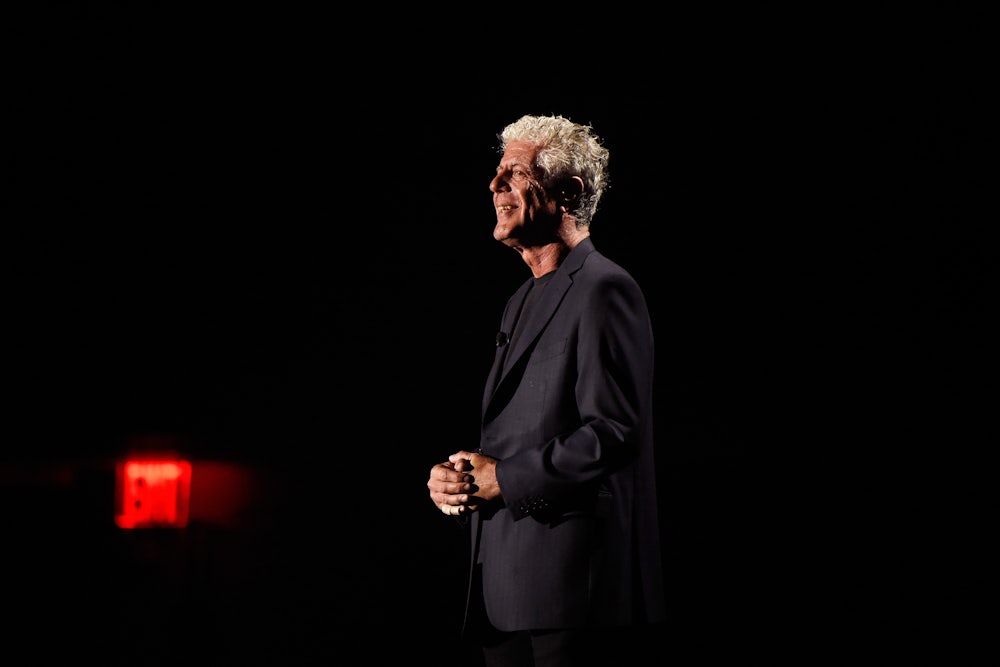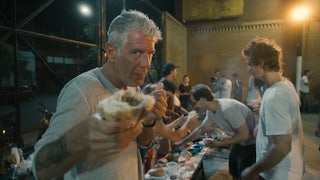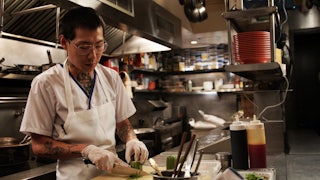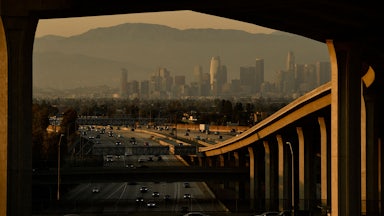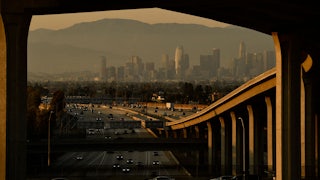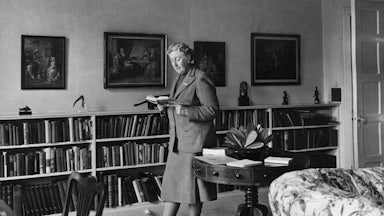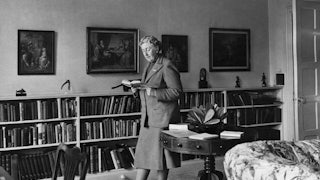I met Anthony Bourdain once, and really only in passing. It was 2013; he was nearing the height of his fame and power, having left his Travel Channel show No Reservations for the deeper pockets and larger audiences of Parts Unknown on CNN. I was the operations manager of a performing arts center in Pittsburgh at the time, and he was doing a live show with his friend and foil Eric Ripert. The performance was titled, cheesily but appropriately, “Anthony Bourdain and Eric Ripert: Good vs. Evil.”
After the performance, there was a VIP meet-and-greet in one of the theater’s lobbies. It was catered by a group of prominent local restaurateurs who were just then beginning to expand from a single flagship restaurant into a small empire of slickly appointed not-quite-fine-dining joints. Bourdain gripped and grinned his way through the event, obviously not enjoying himself but politely engaged enough that you would only notice his discomfort if you were paying close attention. Afterward, he graciously stuck around and met the tatted-up chefs and line cooks who had come there to cook for him. One of them, a young woman, revealed a tattoo—on her calf, if I remember right, but it may have been an arm or a thigh. It was a tattoo of Anthony Bourdain. He got an evil glint in his eye, and he ribbed her—more than he needed to—while they took pictures. Did anyone else notice? It was a very minor cruelty, and I think the excitement in the room covered it up. But I remember it.

There are few more wearying postures than the affectation of unshockable know-it-all-ism that the press critic Jay Rosen called “the cult of savvy” and later simply “the savvy style,” which responds to every revelation and newly damning detail about the world and the powerful and famous people in it with a knowing shrug—Oh, didn’t you already know? So please forgive me when I say that the overwhelming urge when reading Down and Out in Paradise: The Life of Anthony Bourdain, Charles Leerhsen’s new and already somewhat polarizing new biography of the famous chef, TV personality, and raconteur, is to shrug and mutter, “And?” Wasn’t Bourdain’s appeal to fans always that he was not a saint? That he was a complex, flawed, brilliant, juvenile, kind, irascible, short-tempered, curious, bone-headed, lovable, hateable mess of a contradiction of a man—that it was precisely his deeply imperfect humanity that made him such an extraordinary mirror and interlocutor for so many people? How could he have been a saint? He was too interesting to be virtuous.
Down and Out in Paradise draws its narrative tension from missing this point and trying to demystify and decipher a saintly image of Anthony Bourdain that I am not certain many people really believed in. The pre-publication buzz around the book centered largely on the fact that Leerhsen had gotten hold of many of Bourdain’s texts and emails, including those he wrote in the last days before he took his own life in 2018. Leerhsen quotes, particularly, Bourdain’s final text exchanges with Asia Argento, the Italian actor and controversial #MeToo movement figure whose volcanic affair with Bourdain would cast a deep shadow over the final years of his life. With this access, along with on-background information about the inner workings and turmoil of its subject’s later years, advance publicity intimated that unlike the encomiums that poured in after his death, unlike the documentary film Roadrunner (which had many flaws but is unfairly treated in Down and Out as something approaching hagiography), this was going to be the real story of Anthony Bourdain. Untold. Unfiltered. Raw.
Though Leerhsen casts a wide net, the book ultimately aims to explain how and why Bourdain came to his specific tragic end. Didn’t he have it all? Did it not defy the conventions of plot and character that we expect from our heroes and celebrities, even the publicly (and self-consciously) complicated ones? It is a very American inquiry, one that I suspect Anthony Bourdain, who distrusted easy answers and simple explanations, would not have approved of. The answers Down and Out proposes are superficially satisfying but unfailingly schematic, and it’s hard not to think of something Bourdain once said, in voiceover, when he went to Iran: “I’ve seen it on TV and read about it in the papers; it’s a much bigger picture. Let’s put it this way: It’s complicated.”
Leerhsen deserves credit for tirelessly sourcing stories of Bourdain’s early life, about which Bourdain himself was always oblique in his writings and public performance of self. The portraits of the sporadically stable but perennially disappointed Bourdain household, of his parents’ disenchantment with themselves and each other, of Tony’s own adolescent rebellions—at turns harrowing and cringey—are told with some verve. His artistic inclinations (he was a talented amateur cartoonist) are a charming surprise; his ability, from his earliest adolescence, to drink, smoke, snort, and drop more than anyone in his circle is anxiety-inducing even if you’ve drunk, smoked, and snorted a fair amount yourself; his habit of carrying nunchucks (later, a samurai sword) on his belt long after he should have grown out of it is vicariously embarrassing.
Yet these episodes often descend into blithe armchair psychoanalysis. Leerhsen goes to some length, for example, to depict Bourdain’s mother, Gladys, as a snob and a martinet, and it is a documented fact that Bourdain had a fraught relationship with her. But when he finds Bourdain writing in Medium Raw that he “did not want for love and attention,” that his parents didn’t beat him or drink too much or force him to go to church, that he always got what he wanted for Christmas,” Leerhsen cannot believe it. Bourdain wrote that he was enraged by “the smothering chokehold of love and normalcy in his own home.” To which Leerhsen replies: “Enraged by normalcy? As a justification for perpetual anger, this sounds no less suspicious than the previous ones we’ve seen him proffer.” Does it, though? It was a theme Bourdain returned to, frequently, throughout his life. And Leerhsen himself, just a dozen or so pages earlier, in a flourish of unnecessary literary reference, writes unambiguously of Leonia, the charmed New Jersey suburb where Bourdain grew up: “Of course, suppurating just below this tranquil surface was the vast sea of fear and disappointment on which writers like Cheever, Updike, and later Rick Moody set sail.”
These little embellishments occur throughout the book and contribute to its rather strange tone. There are weird references to semi-obscure sporting events. Of Bourdain’s contention, also in Medium Raw, that his early fuck-ups worked out for the best by making him a more interesting man and writer, Leerhsen avers, “Quite possibly—but by suggesting that everything in the end had turned out for the best, Tony made the same mistake that Willie Shoemaker made aboard Gallant man in the 1957 Kentucky Derby: he stood up in the irons too soon.” At times, he seems to affect a kind of swinging ’60s, Rat Pack lingo, as when he describes Bourdain and his first wife, Nancy Putkoski, as “a dazzling duo, the quick-to-smile Cruiser king and his alluringly expressionless queen.” At others, he almost exactly apes Bourdain’s own TV voiceover style: “A chilly dark night, you say? A rain-smeared windshield? Shadowy figures in tenement doorways? Perfect!”
Down and Out is fascinated by the inconsistencies between Bourdain’s memoirs and the real biographical details of his life, although it also somewhat po-facedly compares him to Montaigne—hilariously, by calling him willing “to put himself out there and take the risk, in the manner of Montaigne, of being real.” Exaggerations and artful elisions are any memoirist’s stock-in-trade, and Bourdain, an almost comically devoted cineast, was usually willing to admit—if sometimes after the fact—that he’d punched up a scene for effect. But there is a running insinuation that there is something to be discovered here, that the slippage between Bourdain’s self-presentation as a writer and presenter and his real self was in some manner different from that of any other self-created celebrity—whereas it always seemed to me that Bourdain was more willing than most to slyly acknowledge, often in his own monologues, that he was only playing himself on TV.
Looming over the entire narrative is l’affaire Argento, Bourdain’s doomed terminal romance, which his friends and colleagues hated but tried to tolerate even as Bourdain grew more difficult and more distant. Down and Out portrays Argento as an impossible femme fatale, impossibly sexy but perhaps a bit past her tabloid-image prime, stringing a clearly besotted Bourdain along and accepting favor after favor (help with finances, an apartment, a nanny for her children, the chance to direct his show), then going out of her way to be seen in public with other men. Some of this feels unfair, the inevitable result of score-settling by friends and family whose positions in Bourdain’s life she usurped or made untenable—after all, it seems plain from their own text messages that they’d never agreed to monogamy, and though the selection of texts seems designed to portray her in this negative light, Bourdain comes off badly himself: pushy, entitled, and trying to rewrite an arrangement on the fly to suit his own needs and desires.
The book wants to intimate that she happened to Tony, but it seems all the more likely that they happened to each other, two addictive personalities whose fetish and delight was feeling miserable together. This is, after all, no small part of what addiction is—we even see Bourdain suggesting as much himself, earlier in the narrative, when he says that feeling a little dopesick is part of the point of doing heroin. It is hard to explain to someone who has never felt the tug of addiction or lived with someone who has, but to some degree, shame, pain, and degradation are part of the appeal. These are the feelings—not the high, not the euphoria—that actually crack a user loose from “the smothering chokehold of love and normalcy.” And oddly enough, for a book whose—pardon the expression—value proposition is that it will tell you the darker, the truer story of Anthony Bourdain, it drifts perilously close to suggesting Bourdain had no agency in the final months of his own life.
Argento declined to be interviewed by Leerhsen. “It is always Judas who writes the biography,” she writes to him—too much credit, since a Judas is by definition a part of a subject’s inner circle. But it put me in mind of something that a fictional version of Oscar Wilde said in someone else’s play. “Art,” Oscar Wilde declares in Tom Stoppard’s The Invention of Love, “cannot be subordinate to its subject, otherwise it is not art but biography, and biography is the mesh through which our real life escapes.” I recently rewatched a handful of episodes of Parts Unknown—Bourdain’s trips to Sichuan, to the Bronx, to Iran—and was struck all over again by just what an extraordinary presence the man had become, even as you can see, in almost any shot, that evil glint, the glimmer of the director-dictator with the killer instinct and the megalomania that often accompanies genius underneath. I am no closer now to understanding how those two men coexisted in that one person. But I am more convinced now than I was before that you’re not going to get there by trying to pry them apart.
